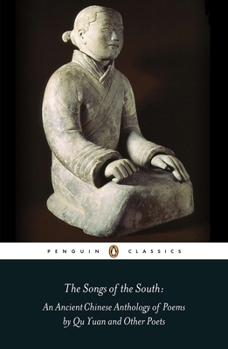The Songs of the South: An Anthology of Ancient Chinese Poems by Qu Yuan and Other Poets
Select Format
Select Condition 
Book Overview
Masterworks of early Chinese poetry Dating from the second century AD, this anthology is the second- oldest collection of Chinese poems in existence. The poems, originating from the state of Chu and rooted in Shamanism, are grouped under seventeen titles and contain all that we know of Chinese poetry's ancient beginnings. The earliest poems were composed in the fourth century BC, and almost half of them are traditionally ascribed to Qu Yuan. In his introduction to this edition, David Hawkes provides a fascinating discussion of the history of these poems and their context, styles, and themes. For more than seventy years, Penguin has been the leading publisher of classic literature in the English-speaking world. With more than 1,700 titles, Penguin Classics represents a global bookshelf of the best works throughout history and across genres and disciplines. Readers trust the series to provide authoritative texts enhanced by introductions and notes by distinguished scholars and contemporary authors, as well as up-to-date translations by award-winning translators.
Format:Paperback
Language:English
ISBN:0140443754
ISBN13:9780140443752
Release Date:January 1985
Publisher:Penguin Group
Length:352 Pages
Weight:0.58 lbs.
Dimensions:0.8" x 5.1" x 7.8"
Age Range:18 years and up
Grade Range:Postsecondary and higher
Customer Reviews
1 rating
Ian Myles Slater on A Mysterious Classic
Published by Thriftbooks.com User , 20 years ago
This edition of "Songs of the South" is a revised form (1985) -- rather more extensively altered than Hawkes' modest description might suggest -- of a complete, and annotated, translation (first edition 1959) of one of the oldest anthologies of Chinese poetry. Among surviving poetic texts, the "Ch'u Tz'u" (Wade-Giles transliteration) is supposedly second in age only to the "Book of Songs," traditionally edited by Confucius himself. Time and layers of interpretation, mainly derived from an early commentary of uncertain reliability, have made it a difficult work, but it is reputed to contain poetry of great beauty. David Hawkes managed to capture at least some of that beauty, and to supply an interpretive framework, and a great deal of fascinating lore about early Chinese civilization. Large portions of the "Songs of the South" in fact clearly belong to the Han dynasty, several centuries later. These sections are imitations and extensions of a group of poems supposed to be the work of a certain Qu Yuan (Ch'u Yuan), a minister of the state of Ch'u (Pinyin Qu) in "southern" (now more like central) China, around 300 B.C. These "original" poems are themselves supposed to be imitations of traditional religious songs of the region, written by the minister while in exile from the royal court, and intended as criticism of the king's policies, and treatment of the author. The shamans (men and women) who courted the gods are seen as the minister seeking the king. Their supposed author himself became the subject of a sentimental legend of a noble official who drowned himself rather than witness the destruction of his ruler and country, and was later still connected with the Dragon Boat Festival, which was said to re-enact the search for his body. The exotic and troubling imagery of spirit lovers was thus adjusted to the self-image of the scholar-bureaucrats of Imperial China. Although this political reading still has its defenders (see Geoffrey R. Waters' "Three Elegies of Ch'u" for an elaborate example), Hawkes spent decades studying this original core as more or less direct reflections of Chinese religion, myth, and legend before they were subjected to Confucian systematization. From this point of view (shared by, among others, Arthur Waley, who also translated a number of these poems), the appropriation of their imagery for Taoist-sounding visionary poems and prose extravaganzas in the rest of the anthology makes perfect sense. A political application of the relations between a shaman (male or female) and a sought-after deity is, of course, not ruled out. The "Nine Songs" (actually there are more; eleven) are extremely moving, whatever interpretation is adopted. Another of the early poems, "Tian wen," or "Heavenly Questions," appears to be a collection of riddles about early gods, kings, and heroes, and is a somewhat opaque source of evidence for early Chinese narratives. Hawkes supplies it with fascinating notes, and cautiously favors the theory th






